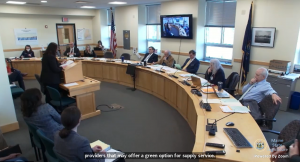
Yesterday, Maine Legislature’s Energy, Utilities, and Technology Committee held a hearing on LD 1431, with proposed amendments that have faced stark criticism from those who argue that they would all but end Maine’s competitive market and remove energy choice for its consumers.
While the bill’s overarching aim is to create a more regulated market for renewables and to incentivize competitive electric providers (CEPs) to participate in energy transformation projects, the legislation contains several problematic sections that would instead stifle competition in the state, remove choice for its consumers, and jeopardize the state’s ability to meet its RPS goals.

Deirdre Schneider spoke on behalf of Maine’s Public Utility Commission (PUC) on the organization’s concerns about the policy: “The PUC also has additional concerns about capping the prices that a CEP may charge. There have been instances where a CEP offers a firm rate that is higher than the SOS for a period of time but lower at other times, resulting in customers saving money in the long run because the price they locked in was ultimately less expensive than the SOS. This would not be possible if the amendment is moved forward. Moreover, setting a cap for CEPs is inconsistent with market competition…”
The legislation, as the PUC rightly identified, contains a damaging provision that would set a price cap on the rates that CEPs can offer, disallowing rates that go above the utility’s standard offer service (SOS) for any period of time. This proposed policy is inconsistent with the state’s competitive market and problematic for a number of reasons outlined by the variety of concerned stakeholders who spoke at the hearing.
Jeremy Payne, representing the Maine Renewable Energy Association, elaborated on how the legislation would be a setback for Maine’s RPS standard. “Removing such a wide swath of clean energy resources from our RPS will have the effect of tightening supply, and thus likely causing prices to increase… If the goal is to create a unique class of renewables to serve Maine consumers, then the CEP marketplace can already accomplish this goal under the current law. We suspect this may not be happening already because there is insufficient consumer demand for a subset of clean energy.”
Marc Hanks of NRG further explained the issues behind setting a price cap for CEPs, explaining “CEP product pricing should not be compared to utility SOS. They are vastly different products. CEP pricing includes value-added products that can be beneficial to state RPS goals. For example, you can bundle community solar, energy-saving devices, EV chargers, and other renewable energy products. It’s incongruent to propose market caps, which would have a devastating impact on the ability to promote retail energy, which is not what the bill intends to do. CEPs are part of the solution, offering voluntary products. We stand ready to support the Maine market and the necessary consumer protection methods that can be implemented. We look forward to helping implement those with the committee.” View Hanks’ testimony here, starting at 4:58:00.
Maine’s competitive energy market offers one of the last lines of defense for Maine customers facing unprecedented increases in their energy bills. According to a list of offers hosted on the Maine Office of Public Advocate’s website, there are 20 available offers from competitive retailers for residents to choose from.
*Calculations based on 1,875ft2 average energy usage of two-resident home = 1,173 kWh/mo
Maine customers can shop, switch energy suppliers, and save money while using 100% renewable energy. These plans range from 6-24 months in length and some offer value-added benefits such as EV charging incentives.
Unfortunately, special interest groups are pushing a narrative that retail energy customers pay more than utility ratepayers, using a “study” that whistles past many inconvenient facts. The handpicked data supports a pro-utility monopoly narrative, selecting an intentionally limited time period when utility rates were in decline, rather than examining a retail energy supplier’s fixed, long-term contract. It’s worth noting that the report’s author, Susan Baldwin, has popped up in several states as an “expert” advocating that states force their retail energy customers back under the utilities’ thumb.
Despite the fact that customers can choose renewable options with CEPs, helping to accelerate the state’s clean energy goals while saving money, this study is cited in a bill intended to address the climate crisis.
Chris Ercoli, President and CEO of the Retail Energy Advancement League, explains: “It’s disappointing that despite the clear opportunities CEPs offer to support Maine’s clean energy goals while protecting its residents from rate shock, lawmakers and special interest groups continue to attack the competitive market. Now is the time to support the market. We would look forward to collaborating with the committee to enhance consumer protections rather than restrict the ability of competitive suppliers to serve Maine’s customers and further its climate goals.”
Following today’s testimony, the Energy, Utilities, and Technology Committee will review the information presented during the hearing and hold a working session to discuss the document further and make necessary changes.